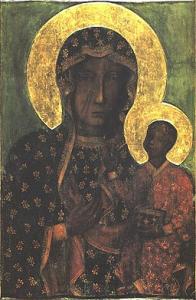Mary, the Mother of God
By Karl Persson
I must begin with a confession: I’m not good at dealing with Biblical passages that describe joy. It’s not because I disbelieve in the existence of joy or think it wrong to rejoice. Nor is it because I haven’t experienced joy myself. Rather, it’s because one of the most concerning developments among modern Christians is our conflation of joy and triumphalism. What perhaps at one point began as true joy – accompanied as always by the gratitude of poverty and humility – is slowly replaced by a sense of entitlement until the source of joy is taken for granted and faith becomes a game of confidence, one-upmanship, and victory at all costs. Not to mince words, this is exactly what we have encountered over the past number of years in the cult of Trumpism, which, though its leader’s power slips daily away, nonetheless stands as enduring evidence of a major catechetical failure among Christians.
In the wake of such triumphalism, it’s easy to be turned off by much of the language of today’s readings for the Solemnity of Mary, Mother of God. The references to Israel in the first reading and various nations in the Psalm refer in context to nations submitting themselves to justice and God’s laws, but they also remind us just how easy it is for us modern Christians to conflate faith and politics in an idolatrous nationalism, exactly the opposite of what these passages are describing. It’s difficult to hear the word “exult” in the Psalm when our most immediate examples of Christians exulting are not due to the equity of God’s rulership, but rather because of the “victories” of the biggest bully on the block. Even the passage about sonship from Galatians reminds us that some of us enact this sonship, not with the gratitude and selflessness the passage calls for, but rather like the elder brother in the parable of the prodigal son, as a marker of inheritance that we carefully and selfishly protect against interlopers. To be sure, none of these associations are inherent in the passages we encounter today, but we can’t help thinking of them as we read them from the perspective of our current religious context.
But while these associations may be our own rather than the text’s, there were obviously many ways of similarly misreading the message given the shepherds in today’s gospel: “Glory to God in the highest, and on earth peace to those on whom his favour rests” (Luke 2:14). Notably, the concept of peace was a live topic in Roman propaganda of the time. Caesar Augustus, then the Roman emperor, remains famous to this day for initiating the 200 year-long Roman peace known as the Pax Romana, and though that precise term itself was only recorded after the death of Augustus, he did style himself as a “prince of peace” of sorts, closing the gates of war in Rome no less than three times during his lifetime, and erecting an altar in Rome consecrated to Pax, the goddess of peace. From the Roman perspective, this peace was no doubt wonderful, a welcome time following a period of civil war. But as the nations conquered by Rome knew intimately, there still existed within this so-called peace the oppressions of colonialism. To the average Jewish person manipulated by political forces such as the census that brought the holy family to Bethlehem, the “peace” of Rome might very well have looked like oppression glossed over by a thin veneer of positivity implied in a glossy language of beneficence. The shepherds of course did not respond to the announcement of Christ’s peace with regard to this more cynical political context, but I imagine there might have been some who scoffed at news of the angels’ announcement. Much as the language of today’s passages reminds us perhaps a little too much of some of the triumphalist rhetoric of our fellow Christians, so it is probable that, for some, the angels’ words sounded just a little too much like the propagandic “peace” of Caesar Augustus.
Given these ways in which culture can eclipse and sour our way of receiving what is in fact good news, it is necessary to wonder how we can learn to re-hear these words in a fresh way, freed from the appropriations of pride and triumphalism. And while there are many valid responses to this question, I want to discuss the one pointed to in today’s gospel: “And Mary kept all these things, reflecting on them in her heart” (Luke 2:19). What I love here about Our Lady’s response to the shepherds’ news is that it is preliminary and not instantaneous. We don’t know whether Mary joined in the rejoicing. She very well may have and probably did in some parts of her being. Yet there is also a pause here that speaks to a certain kind of spiritual maturity. In the spiritual life, rejoicing often comes most easily at the beginning of faith, when everything appears shiny and new. But there always comes a point in the life of faith when spiritual things become more difficult to contemplate. At this point, we must ponder through the riddles and paradoxes of God even while very often wondering what in the world He is doing and fearing it may not all be for the best.
It is only my educated guess, but when I imagine Our Lady pondering in her heart, I can’t help but reflect on the way she seems to be participating in this mature kind of contemplation, mirroring the wisdom of complexity modelled in Old Testament books like Ecclesiastes and Job. In the spirit of the collector and assembler Qoheleth (of Ecclesiastes), she collates sentences about Christ in her mind, letting them rub against one another until the truth comes out. The Latin term for what she does with these words about Christ is conferens, which among other meanings could suggest multiple voices and perspectives inside her head debating the way the characters do in the book of Job. To be sure, plumbing the full depth of Our Lady’s recollections here must be impossible, but I think it is safe to say that part of it involved this traditional Hebrew way of working through thorny and difficult issues. Indeed, Christ’s incarnation itself is such an issue that cannot be reduced to a cause for rejoicing simpliciter, for it is certainly a cause of trouble as well, albeit in the best possible way; as Flannery O’Connor’s Misfit notes in “A Good Man is Hard to Find,” “Jesus [has] thown everything off balance.” In taking this stance of difficult contemplation, Mary was merely anticipating the words of Simeon, who later would prophesy the swordlike way her child’s life would wound her, as well as the way he was “destined for the fall and rise of many in Israel, and to be a sign that will be contradicted” (Luke 2:34).
All this to say that in Mary’s response to the encounters she collected we can find an answer to our own tendency to appropriate the Christ Child and his holy words. Whereas it is completely right and proper that we should rejoice at Christ’s birth, and that we should do so heartily, we always face the temptation to explore merely that rejoicing, and let it become the kind of superficial triumphalism that is the hallmark of our age. Lest we be tempted by this, let us join Our Lady the Mother of God in her contemplative heart as we ponder the mystery of the Christ child she has borne.













